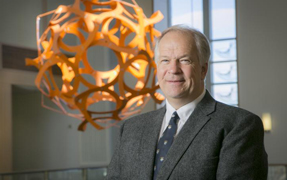Malte Gather: Fluorescent proteins and creation of a "living laser"
Derived from jellyfish, fluorescent proteins in cells are a viable gain medium for optical amplification.
Malte Gather has recently become a full professor of biophotonics at the University of St Andrews in Scotland. His interests include optical amplification and lasing in novel materials and systems, including biological/bioinspired structures and plasmonic devices. He also works on organic light-emitting diodes, in particular on improved light-outcoupling and on developing highly-integrated lab-on-chip biosensors.
Gather obtained BSc, MSc and PhD degrees from RWTH Aachen, Germany (2003), Imperial College London, UK (2004) and University of Cologne, Germany (2008), respectively. He worked at the University of Iceland (2008/2009) and Harvard Medical School, US (2009-2011) and was an assistant professor at TU Dresden, Germany (2011-2013). He has received various awards, including the Rudolf-Kaiser Prize (2012), awarded annually to a young German physicist, the PhD award of the German Physical Society and the Bullock-Wellman Fellowship. Since 2007 he has authored 50 ISI-listed papers (780 citations, h-index 15).
He was interviewed for SPIE Newsroom in August 2013.



